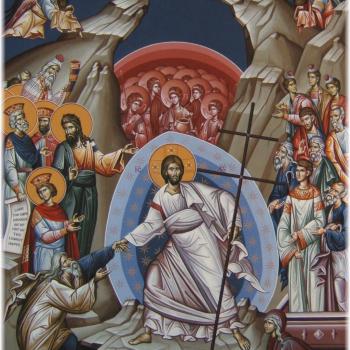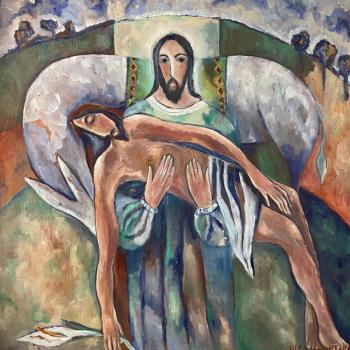He will come again in glory to judge the living and the dead,
And his kingdom will have no end.
There we have it. Christ is judge. And with that bit of information, there are countless people both inside and outside of the church who walk away. Why insist that Christ is judge? And why – of all things – feature it in a Creed that occupies so few lines?
Doesn’t this just prove that Christianity is for judgmental and cruel prudes? Doesn’t it prove that God is really out to get us? Doesn’t it prove that – for all the church has to say about love – that it is all just smokescreen and window dressing for condemning people to hell and sending a handful of people to heaven?
At first blush, it certainly sounds like it, especially if you have never looked evil straight in the eye. Especially, if you have never seen the unspeakable horrors it inflicts. Especially, if you have never watched your future be destroyed. But what if we get in touch with just how far we can sink?
Let me offer you an example. Recently, I’ve been listening to Ken Burns’s new documentary on the United States and the Holocaust. Burns, who confesses his own deep love of America, notes that in exploring this subject, he was troubled to learn that our history as a country is anything but straightforward and laudable.
Contrary to the popular storyline that describes the GIs as the first Americans to discover the horrors of Nazi concentration camps, most Americans already knew that Jews were being exterminated in horrific numbers. They knew it from radio reports, newsreels and newspapers. Newspapers alone, for example, published over 3000 articles on the persecution of Jews during the first 100 days of Nazi rule in 1939. And, to be fair, many Americans were alarmed by the news and took to the streets.
But prominent Americans in both political parties and the diplomatic corps knew what the Nazis were doing and supported the Nazi cause. Joseph Kennedy, the father of our thirty-fifth President and ambassador to the United Kingdom, was among them. Although the United States admitted 225,000 Jews (the largest number of Jewish immigrants accepted by any country). There was widespread opposition to allowing Jews to emigrate to the United States, and hundreds of thousands were trapped in Germany and other countries by broad opposition to allowing them to emigrate, among them Anne Frank and her family who tried repeatedly to come here.
And it wasn’t just leaders who were implicated: Large numbers of every day Americans defended, endorsed, or applauded the extermination of Jewish people. Appallingly, older members of our own families remarked when we were children that the Allied powers should have waited to win the Second World until after, as they put it, “Hitler finished the job.” Even earlier generations of Jewish immigrants, protested, “We are Americans and they are not. They gnaw on the bones of past centuries.
And – to make matters worse – the Nazis even borrowed on the ideology, theories, and practices that were developed here by American intellectual and political leaders. Burns notes that the architects of what the Nazis described as “the Final Solution” relied on the work of those who crafted Jim Crow laws. They studied the tactics used to slaughter, subdue, and neutralize native American tribes, and they closely studied the work of Margaret Sanger who advocated eugenics – which is just a fancy word for sterilization and murder.
She wasn’t alone, however. Teddy Roosevelt, Alexander Graham Bell, Henry Ford, and – unbelievably, Helen Keller supported it. Andrew Carnegie and John D. Rockefeller funded it. Universities taught it. Medical societies endorsed it. Clergy preached it, and states enacted laws to enforce it — the last of which was repealed in 2014.
Now, before you go in a direction with this that you will leave you sitting comfortably in your pew let me note this: Toward the end of one interview with Burns about his work, he makes this important observation: Without excusing our behavior as a country, it is important to remember that such behavior is not an American problem, it is a human problem. Anyone – everyone, he notes, is capable of this kind of evil and worse. While the Holocaust may have come close to the bottom of what human beings can do, it did not find the bottom.
Now, let me ask you, can God say, “Never mind, it’s all good. I never meant anything I said about murder and mayhem, the slaughter of innocents, or the destruction of hope”? In a word, “no”, which is why the creed insists that Christ is judge of both the living and the dead.
To argue that God is good and just and to argue that we are saved that we might become more like God means that God cannot ignore evil, excuse it, or approve of it. To say that God is good and to argue that God is indifferent to the slaughter of innocents is not just contradictory, it is obscene. It would be akin to calling someone a good parent who publicly tortured their children.
It would make nonsense of any conversation about right and wrong, about virtue and vice, about innocence and guilt. In the flaccid, sloppy way that we sometimes think about morality, we want God to give us credit for right behavior and to ignore our failings. But if God is, by definition, “the only one who is good” and the only reliable guide into “the good”, then God cannot ignore the difference between good and evil.
For some things to be good, other things are – by definition – evil. For some things to be just, other things are – by definition – unjust. And for some things to be virtuous, other things must be vices. In fact, as some of the early church fathers noted, evil does not have its own existence. It is, by definition, that which is not of God.
And it is also impossible to talk about God making all things right in the end, if God is not judge. No government can restore what was lost. No genius can unwind the damage done or the lives savaged. No amount of money, no ocean of words, no laws can unwind the broken bodies, the shattered bones, the burned flesh, the lost dreams, the infinite future – all of which were erased in gas chambers and ovens designed to dispose of human flesh.
So, what – exactly – does it mean to call Jesus the final judge?
Most people hear the word and assume that it is about nailing people to the wall. Sending people to hell. Maybe even getting even.
But the Greek behind the word, “judge”, is krinein, the root meaning of which is to sift, to sort – to assess. To promise that God will make all things right, to promise that God will wipe away every tear, necessarily entails sifting and sorting. In other words, judgment.
We are bound to see judgment in negative terms, just as surely as our children perceive our efforts to sift and sort life for them in negative terms. My daughter regularly told me that I was the strictest dad she knew and one of her early appeals in an awkward moment in her life was, “Can’t we just cooperate?” But watching over her. Equipping her with values that would sustain her for a lifetime and my modest efforts to care for her when things went badly, all entailed sifting and sorting on her behalf.
And this is what Christ the judge does and must do. To make good on the promise to heal, restore, and wipe away every tear means sifting and sorting the motives and behavior of the living and the dead.
Admittedly, in some cases, that will have painful consequences. There is no hell, like the hell of realizing that the one true God actually exists. That he cannot bent or redefined to serve our purposes or excuse our cruelty. And nothing could be more existentially painful than to realize that we have lived our lives in resolute opposition to the will of the One who made us.
But, equally, it is the only the God who sifts and sorts who can restore us and who can hold safe and return those things that are lost to us. What that actually looks like is hard to say. We are certainly not capable of doing what God has promised to do. And it is impossible to know what restoration and complete healing will look like.
As with most of us, I am sure, we all spend both time and energy being anxious, angry, or aggrieved at things that years later matter very little to us. Who can know how our vision of what is important, necessary, and needful in the presence of Christ the Judge. The sifting and sorting will no doubt make us all more aware of failings, grateful for the grace that we have received, more forgiving, and more loving.
What I can be sure of is that God is loving, good, merciful, and a just judge. Whatever he does will be shaped and balanced by a perfection that we can’t imagine. For now, however, it is worth remembering that Christ is the judge, not us.
This does not mean that we should not defend the right and the good. It does not mean that we should work for the dignity of others or for justice. It does not mean that we should not care for the poor, the widowed, the orphaned and for all those who are stranded in our society by life’s circumstances. These endeavors are a part of our baptismal vows, and we should take them, very, very seriously.
But if Burns is right – and he is – and evil is a human problem. And if the Creed is right – and Christ is judge, then we should remember that no nation, no race, no gender, no ethnicity, no political party, no individual can confidently declare itself the infallible judge or the arbiter of that which is good and right.
Nothing – nothing in this century – is more frightening or more dangerous, than the self-righteous, judging certainty which characterizes the behavior of us and our leaders. Whether one thinks of figures armed to the teeth with military power, like Vladimir Putin or Xi Jinping – or one thinks of the average American with a Facebook account – everywhere you look the world is filled with judges of the past and the present. Judges that sort and sift opinion, public behavior, private convictions, the use of words, the choice of friends, and political convictions.
And regardless of the differences in our power and influence, when we do this, when it becomes our perennial preoccupation, we share one thing: The dangerous assumption we are the judges of all that can and should be, of all that is worthy of life.
That may well explain why a dangerous authoritarianism has crept into the language people on both the left and the right, why western democracies are entertaining assisted suicide and euthanizing those struggling with mental illness, and why the airwaves and the streets are filled with people who threaten and take the lives of others. This much is certain, the difference between this trend and the trends that set the Holocaust in motion is negligible.
Against this dangerous certainty, the Creed reminds us that there is only one final judge. And, thank God, we are in his hands.













